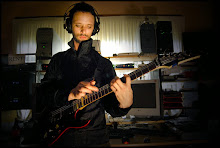Workshop and Forum 27/07/06
Listening Workshop 27/07/06:Stephen Whittington, in the absence of David Harris, gave the group an informed insight into several categories:
1) Program notes:
I may have been guilty of overshooting the word count in my program notes for last semesters’ projects. However, I was only aiming for the suggested word count provided in the instructions. I think overall my program note achieved the desired result but may have taken longer than the piece, if read slowly and carefully.
2) Analysis:
Quoting the analysis instruction sheet given to students regarding semester one projects:
“Analyse your composition in detail (400 words). The analysis will detail: Musical and/or audio processing; Language understanding and usage; Aesthetic development and research; and Form and structure.
Quoting the paper regarding analysis handed out by Stephen Whittington at this weeks’ workshop:
“An analysis is not: a simple description of the work, or of the process of composition. A proper analysis requires synthesis of the materials derived from analysis into an overview of structure and form, and may also yield interpretative insight into the nature and significance (‘meaning’) of the work.”
Now I don’t know about the rest of my colleagues, but I feel that had the instruction sheet also contained the above quote from Stephen, I may have been better informed and come up with a more convincing analysis of my project. I do think I managed to follow all the instructions we were given though.
3) Score:
My piece had a definable rhythm so I was able to get away with some conventional notation to some extent:
(Insert image)
I probably could have been more imaginative with this but as Stephen suggested, it needs to provide some insight into how the piece could be recreated on at least some level and I think there is enough information for that.
Forum 27/07/06:
Martin Armiger:

I was looking forward to Martins talk, due to my curiosity regarding film score composition. I’m not necessarily interested in pursuing a career in this field (it certainly seems to be no bed of roses) but I think there is a lot to be learned from the processes used by film composers.
Martin didn’t disappoint, with a dynamic and informative presentation that held my attention from start to finish. The Power-point slides he displayed were easily understandable and served to break down the compositional process for closer investigation. I didn't need to see all of that gratuitous scene from Tarantinos' Reservoir Dogs again though.
There has been a lot of focus on film music and sound in this first week of semester two, and it is helping me to develop an informed view of its’ function. Apart from the more subjective functions of the score, such as portraying on screen emotion and following the ‘arc’ of the story, I have never really thought about the difficulty of presenting the real-world sound onscreen with a desired level of realism. The amount of raw sound that must be gathered and manipulated in some cases is staggering. I guess I always thought you could just point the camera microphone at whatever and the result would be satisfactory. I was very wrong………
Reference:
Martin Armiger. "The Problem with Film Music". Artist talk presented at the Electronic Music Unit, EMU space, 5th floor, Schulz Building, University of Adelaide, 27/07/06.
Stephen Whittington. "Program note, Score and Analysis". Lecture presented at the Electronic Music Unit, EMU space, 5th floor, Schulz Building, University of Adelaide, 27/07/06.


0 Comments:
Post a Comment
<< Home